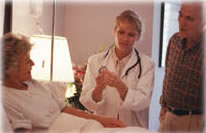


   |
| |
Leeches
Scientific Name(S): Hirudo medicinalis L. Phylum: Annelida Common Name(S): Fresh water leech, medicinal leech Botany: History: The medicinal uses of leeches date back to more than two centuries before Christ. The 19th century heralded the widespread use of leeches for "bloodletting," a practice that grew so quickly that by the 1830s a leech shortage arose in France requiring the importation of more than 40 million Mexican leeches. The last 45 years have seen a resurgence in the use of leeches, particularly as adjuncts in post-surgical wound healing procedures. Uses of LeechesLeeches have been used for bloodletting, wound healing and stimulating blood flow at post-surgical sites. THERAPEUTIC USESMedicinal leeches are used to stimulate the flow of blood at post-operative surgical sites, a procedure that has been claimed to increase the success of tissue transplants, reduction mammoplasty and the surgical reattachment of amputated extremities. The application of leeches to the area immediately surrounding the surgical wound temporarily reestablishes venous blood flow, thereby allowing the nutritive perfusion of the wound site by fresh blood. Blood stasis is a major contributor to unsuccessful reconstructive surgery. It is believed that if sufficient blood flow is maintained at the site until permanent adequate natural perfusion is established, the affected tissue has a significantly improved survival rate. After attaching to the site, leeches secrete compounds that reduce blood viscosity; they also draw from 20 to 50 ml of blood from each bite. The leeches provide the drainage needed to permit decongestion and to preserve tissue viability until normal venous flow is established (about 5 to 7 days after the surgery).Side Effects of LeechesAllergic reactions, anaphylaxis and infection, possibly even with hepatitis and HIV, may develop. Toxicology: Leeches may draw up to 50 ml of blood per feeding. Repeated leeching may decrease hemoglobin levels dramatically. Drops of 1 to 2 gm% during a 5-day course are common. Decreases of up to 7 gm% have been observed following a 6-daY course and required tranfusion therapy. Following removal of leeches, the wound site will continue to bleed for up to 4 hours. Several reports have documented severe wound and systemic infections caused by Aeromonas hydrophila (a Gram negative rod) harbored by leeches, and Providentia has been isolated in transport water. Local allergic reactions and anaphylaxis have been reported. A unique case of nasal bleeding was reported in Spain, where a man was found to have a leech in his nostril. It is believed that the leech was transmitted through water from a rural drinking fountain. Summary: Leeches have been used medicinally for centuries and interest in their use continues today. They are used most widely in post-surgical wound management. Although their use is not painful, it has been associated with severe anemia and systemic infections. The clinical development of hirudin and other leechderived anticoagulant compounds may eventually supplant the use of leeches. Experience with the leech continues to grow and to become well documented. |
Family Doctor || Contact Us || Skin Disorders || Diabetes Care || Cellulite Guide || Chemotherapy ||
|
|
(c) Online-family-doctor.com All rights reserved
Disclaimer: Online-family-doctor.com is an information and educational purposes web site only. It is not intended to treat, diagnose, cure, or prevent any disease. Do not rely upon any of the information provided on this site for medical diagnosis or treatment. Please consult your primary health care provider about any personal health concerns. We will not be liable for any complications, or other medical accidents arising from the use of any information on this site.